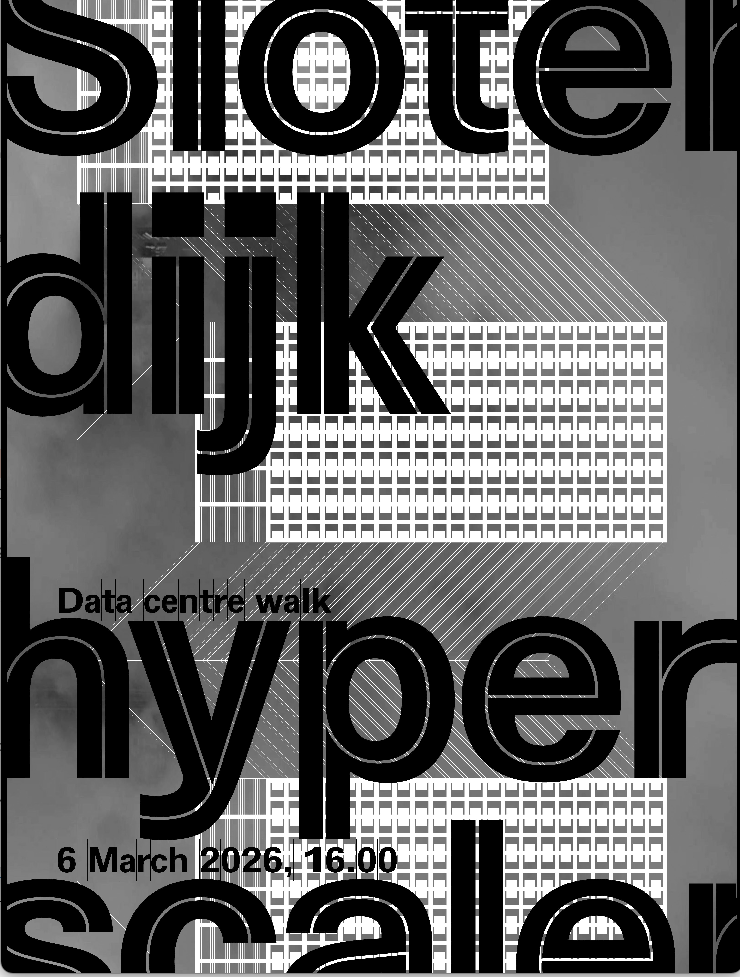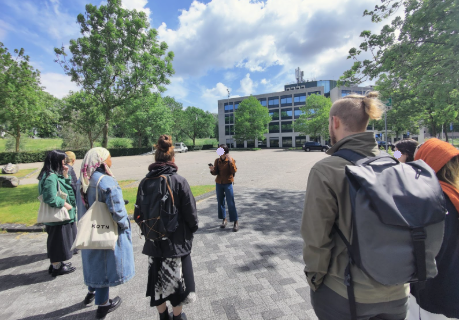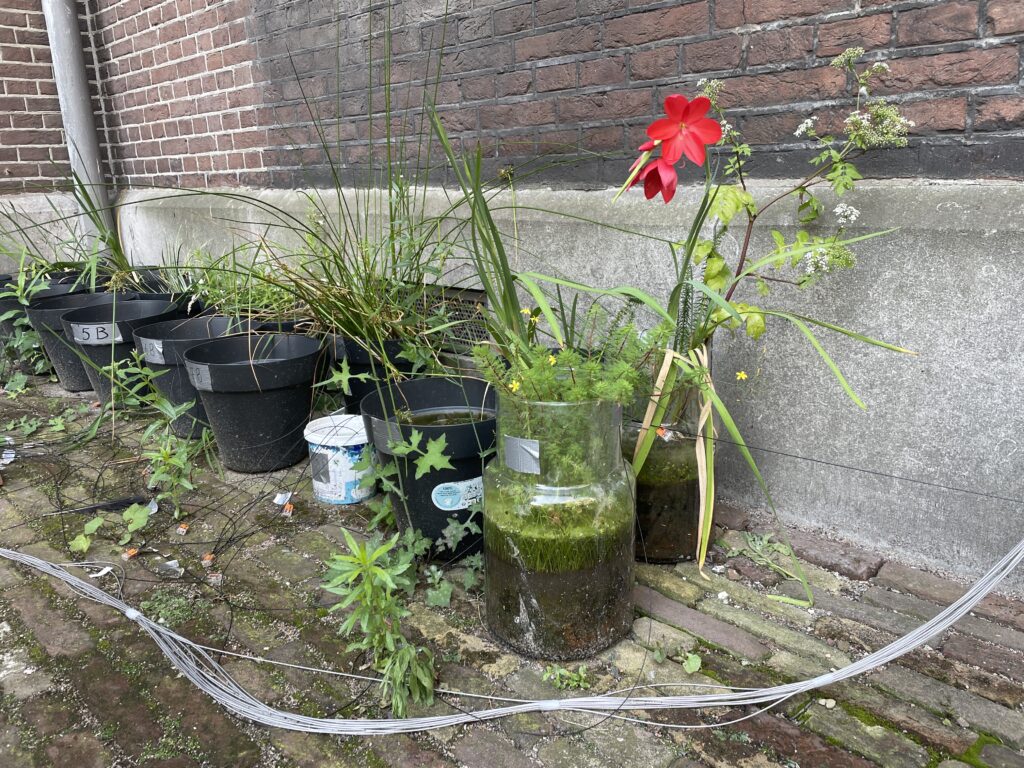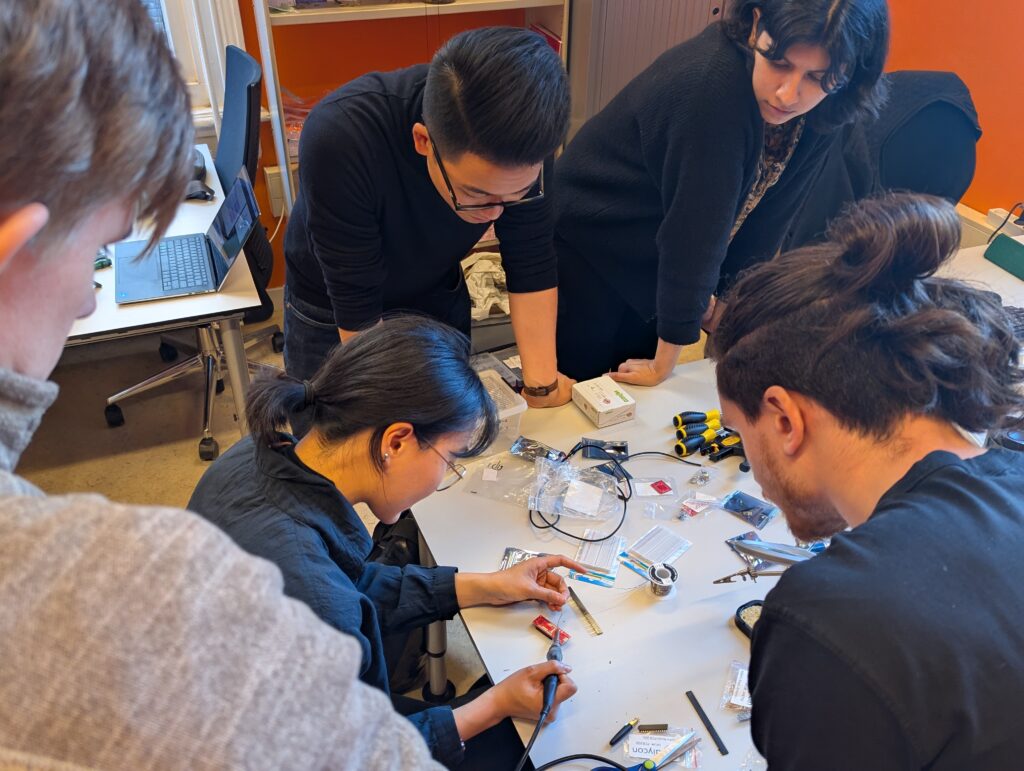open reading group The Root & Router Society Reading Group
bi- weekly tuesday session 16:00 – 17:00 cest/cet* (once every two weeks)
facilitated by niels@criticalinfralab.net, fieke@criticalinfralab.net, maxigas@criticalinfralab.net
meet up here (just show up, no prior notification is needed): https://uva-live.zoom.us/j/6365963924
take notes here: https://pad.criticalinfralab.net/unz6CPM9SpieqIlkXf-Oq
sign up for the mailinglist here (don’t forget to click the link in the confirmation email):
https://lists.ghserv.net/mailman/listinfo/infrastructure-readinggroup
and a calendar event (add to your Google calendar or download an .ics file)
Books for 2026:
– Extraction: The frontiers of green capitalism by Thea Riofrancos
– Cybernetic Circulation Complex: Big Tech and Planetary Crisis by Nick Dyer-Witheford & Alessandra Mularoni
– The Low-Carbon Contradiction: Energy Transition, Geopolitics, and the Infrastructural State in Cuba by Gustav Cederlöf
– The Deadly Life of Logistics: Mapping Violence in Global Trade by Deborah Cowen
January 6th – Extraction: Prologue + Chapter 1 – Cybernetic Circulation Complex: Preface
January 20th – Extraction: Chapter 2 – Cybernetic Circulation Complex: Chapter 1
February 3rd – Extraction: Chapter 3 – Cybernetic Circulation Complex: Chapter 2
February 17th – Extraction: Chapter 4 – Cybernetic Circulation Complex: Chapter 3
March 3rd – Extraction: Chapter 5 – Cybernetic Circulation Complex: Chapter 4
March 17th – Extraction: Chapter 6 – Cybernetic Circulation Complex: Chapter 5
March 31st – Extraction: Chapter 7 – Cybernetic Circulation Complex: Coda
April 14th – Extraction: Chapter 8 & 9
April 28th – Low-Carbon Contradiction: Introduction – Deadly Life of Logistics: Introduction
May 12th – Low-Carbon Contradiction: Chapter 1 – Deadly Life of Logistics: Chapter 1
May 26th – Low-Carbon Contradiction: Chapter 2 – Deadly Life of Logistics: Chapter 2
June 9th – Low-Carbon Contradiction: Chapter 3 – Deadly Life of Logistics: Chapter 3
June 23rd – Low-Carbon Contradiction: Chapter 4 – Deadly Life of Logistics: Chapter 4
July 7th – Low-Carbon Contradiction: Chapter 5 – Deadly Life of Logistics: Chapter 5
July 21st – Low-Carbon Contradiction: Conclusion – Deadly Life of Logistics: Conclusion
If you want to see what we have read before, check the page of the previous infrastructure reading group, and the environment reading group.
* We use CEST between the last Sunday of March until the last Sunday of October, then we switch back to CET.
infrastructure walk Data centre walk – Sloterdijk hyperscaler March 6 March 2026
Join us on March 6th at 16.00 for a data centre walk of the to-be-built but already controversial hyperscaler on the Plimsollweg, near Sloterdijk station. Infrastructure walks are like guided tours of the city, or birdwatching expeditions – but instead of pointing out noteworthy architectural details of historical buildings or showing participants how to best observe particular species of birds, we would explore the digital public infrastructures that are deployed in public spaces. In this case, an empty piece of land.
While it doesn’t look like much, this vacant piece of land is extremely valuable, as it holds the permits to build three data centre towers. After 10 years of financial speculation, the site was purchased by British data center developer Pure DC, with Microsoft as the intended and sole tenant of a hyperscale data center consisting of three towers. In this walk, we will learn more about this piece of land and discuss the allocation of scarce land, computing power, and electricity supplies to an American hyperscale data centre, which ends up coming at the expense of residents, nature, and local businesses.
Registration is closed

workshop MaKING Printed Circuit Boards with Wild Clay March 2026
It is an open secret that the hardware in our smart devices contains not only plastics but also conflict minerals such as tungsten, tin, tantalum, silver and gold.
We are investigating alternative hardware from locally sourced materials, so-called ethical hardware, to develop and speculate upon renewable practices for the benefit of both nature and humans.
We are exploring different materials, sentient, low-impact, non-toxic, fair traded, recycled and urban mined means of production.
We aim to challenge the common PCB (printed circuit board) economies in an artistic, creative, positive and responsible way applying feminist hacking as an artistic methodology and critical framework.
https://feministhackerspaces.cargo.site/Clay-PCB-Tutorial – a workshop in partnership with the critical infrastructure lab and Waag from March 30 to April 2, 2026.
event Eco-feminist decolonial hardware March 2026
It is an open secret that the hardware in our smart devices contains not only plastics but also conflict minerals such as copper and gold. Technology is not neutral!
Artists and researchers Patrícia J. Reis and Stefanie Wuschitz investigate on alternative hardware from locally sourced materials, from a feminist perspective, to develop and speculate upon renewable practices. They call it Feminist Hardware!
Through these lenses, they researched on fair-traded, ethical, biodegradable hardware for environmental justice, building circuits that use ancient community-centred crafts encouraging de-colonial thinking, market forces to be disobeyed, and future technologies to be imagined.
In this lecture, they will share their research process behind Feminist Hardware, and present artistic alternatives that aim to reconnect technology with ecology, community, and care.
Join us on March 30th for the lecture and discussion on eco-feminist decolonial hardware with Patrícia J. Reis and Stefanie Wuschitz. The lecture will take place from 17.00 at the Bushuis. Please RSVP here

—-
About the speakers
Patrícia J. Reis (b. 1981, Lisbon, PT) is a Vienna-based media artist and researcher whose practice explores human and more-than-human entanglements with technology through feminist hacking, sensory interaction, and embodied interfaces.
Her installations investigate touch, consent, and care, often inviting intimate, activeparticipation. Reis studied Painting (ESAD, 2004), Media Art (MA, Lusófona University, 2011), and completed a Ph.D. in Art at the University of Évora (2016). She was a fellow of the FCT of Portugal (2011–15) and Assistant Professor at the Polytechnic Institute of Beja (2006–12). From 2020–23 she was postdoctoral researcher at the Academy of Fine Arts Vienna within the project Feminist hacking: building circuits as an artistic
practice, and guest researcher at the Weizenbaum Institute, TU Berlin. Since 2015, she has lectured at the Digital Arts Department, University of Applied Arts Vienna, where she currently leads the FWF Elise Richter PEEK project Hacking the body as the black box.
Since 2012, she has been a board member of Mz Baltazar’s Lab*, Vienna’s feminist artist-run space. Reis has exhibited widely, received the Outstanding Artist Award in Media Art (AT, 2021), and participated in international programs and residencies, including IMPACT ART San Francisco, Banff Centre (CA), HWK Delmenhorst, and Edith-Russ-Haus (DE).
Find out more about Patricia: www.patriciajreis.com | https://www.instagram.com/patricia_j_reis/ | https://hackingthebody.org/
Stefanie Wuschitz (b. 1981, Vienna, Austria) is a data-research artist based in Vienna. Her scholarship generates data that shapes her artistic output. She investigates the entanglement of gender, technology and power. Within the young, Eurocentric field of data studies, her current projects focus on a blind spot of South East Asia: Indonesia’s position within fast shifting techno empires. Her degrowth inspired artistic method entails upcyling, salvaging sustainable, locally sourced materials to create ecofeminist interactive art installations. Her drawings and animations explore new forms of storytelling, knowledge transfer and documentary.
She graduated in the MFA program Transmedia Arts in 2006 (Brigitte Kowanz) and completed her Master’s at NYU 2008 at Tisch School of the Arts in NYC. In 2009 she founded the hacklab and collective Mz* Baltazar’s Laboratory. She completed her Doctorate on Feminist Hackerspaces at TU Vienna in 2014. Since then she has held post-doctoral positions at the Academy of Fine Arts in Vienna, TU Vienna, Universität der Künste Berlin, and TU Berlin. She conducted several arts-based research projects as PI (titled Feminist Hacking, Salon of Open Secrets, Coded Feminisms in Indonesia). Her artwork was featured in solo exhibitions, film festivals and international venues.
Find out more about Stefanie: https://stefaniewuschitz.at/ | https://www.instagram.com/stefanie_wuschitz/
keynote The State of the Internet 2026 with Fieke Jansen April 2026
During the State of the Internet, Waag Futurelab takes the annual temperature of the internet. This edition focuses on AI and the limits of our planet. The lecture will be given by Fieke Jansen, co-founder of the Critical Infrastructure Lab.
Generative AI and other AI applications are currently being added to our technology everywhere. From search engines and social media to office software and urban infrastructure: AI is everywhere, whether we like it or not. Our digital landscape is changing significantly, but our physical landscape is perhaps changing even more dramatically. The arrival of large data centres, known as hyperscalers, is putting considerable pressure on our power grid and water supply. Local residents are seeing their energy bills rise and their water supply become less reliable.
This year, we are looking at what lies behind our screens: what impact does the growing appetite for data centres and AI computing power have on our living environment, and what are the consequences for the world outside our screens? The possibilities of AI seem limitless, but our planet’s natural resources are finite.
About Fieke Jansen
This year the keynote lecture will be given by Fieke Jansen, co-principal researcher at the Critical Infrastructure Lab at the University of Amsterdam and co-lead of the Green Screen Coalition. Jansen investigates how the infrastructure of our digital world, data centres and AI influence the environment, raw material use and climate.
About Waag Futurelab
Waag Futurelab is engaged in regenerative technology by developing research and design methods that detach technology from purely extractive models and instead make it restorative and circular. In collaboration with the Critical Infrastructure Lab, Waag investigates how technical systems can be designed in such a way that they not only extract value from natural and social resources, but also give back: think of the use of biomaterials, a focus on repair and extending lifespan, and public values that strengthen local ecosystems and social initiatives. Through practice-oriented research and participatory design processes, Waag brings together knowledge from science, art and citizen initiatives to realise technologies that contribute to long-term regeneration rather than depletion.
https://www.waag.org/en/event/state-internet-2026-fieke-jansen
workshop Statecraft, Sovereignty and Digital Government April 2026
A two-day symposium, 16-17 April, 2026, Goldsmiths, University of London.
Dmitry Kuznetsov and Alex Gekker will present on Russia’s Sovereign AI strategy.
https://www.gold.ac.uk/media-communications/research/statecraft-sovereignty-and-digital-government-



